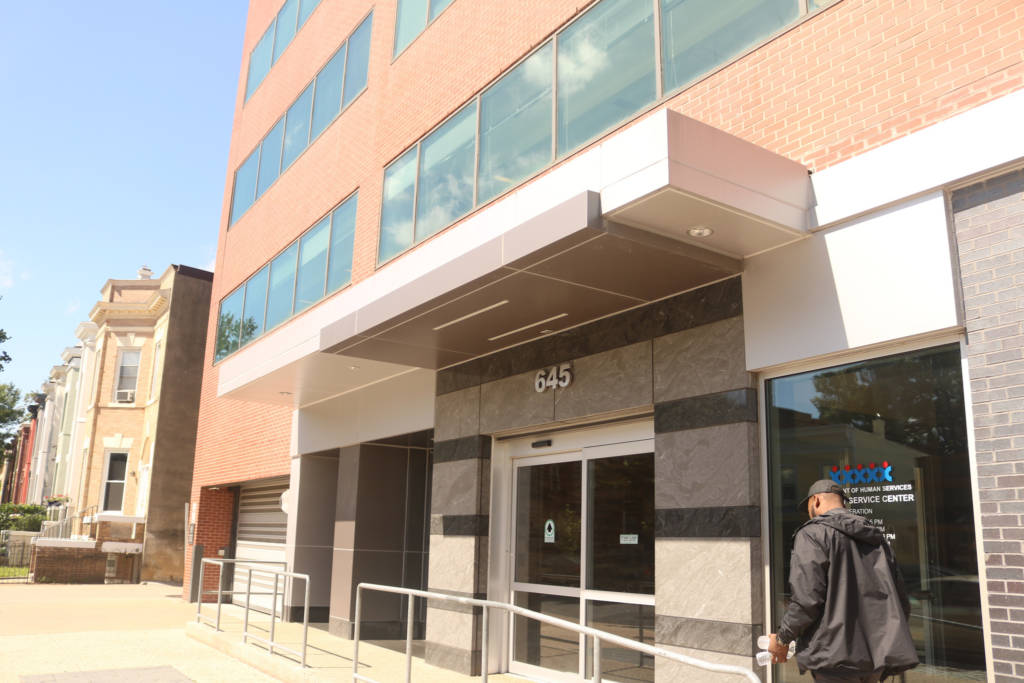The H Street Service Center helps people seeking food assistance and Medicaid. Not even 30 minutes after the service center opened on a recent Wednesday morning, more than 100 people had filled nearly all the plastic blue chairs in the waiting room.
Advocates hope an order from a federal judge means the experience at service centers like H Street soon won’t include worrying whether your benefits will be processed on time.
Last month, Judge Christopher Cooper ruled the D.C. Department of Human Services must invest in resources to ensure District residents who are food-insecure won’t have a long wait for food benefits. Legal advocates celebrated a victory in the lawsuit but recognize that the litigation process will drag on for months.
The class-action lawsuit was filed last summer by the Legal Aid Society of D.C., Hogan Lovells and the National Center for Law and Economic Justice after residents said they were struggling with long wait times to renew their Supplemental Nutrition Assistance Program (SNAP), well known by its former nickname, food stamps.
[Read more: DC Department of Human Services told people to wait on food stamps now it is being sued]
Representatives at Legal Aid said there have been delays in processing benefits since 2014 and those delays got worse when DHS implemented a new computer system in the fall of 2016, despite a warning from federal officials.
During the course of the lawsuit, DHS acknowledged it was processing only 59 percent of recertifications on time. The judge said 59 percent was not enough. The District government must recertify benefits more quickly, according to the 2018 order.
SNAP recipients and legal organizations involved in the lawsuit proposed DHS follow the existing regulations, such as providing households with a timely notice of expiration of their food stamps and the opportunity to receive food stamps within 30 days of their last allowance – with a 4 percent margin for error.
The judge asked legal organizations to create a system for the department to better track the time it takes to process benefits, in order to hold DHS accountable for delays.
Food-stamp recipients who testified in the case told the court they struggled to get sufficient nutrition and pay their other bills because of these delays.
“I would just have days where I didn’t get enough to eat,” said Nelson Bostic, a plaintiff in the class-action suit.
“I couldn’t keep up with the rent because I needed the money for food … I also got behind on my electric bill,” said Diamond Moore, a plaintiff in the class action lawsuit.
“The harms described in these affidavits — forgoing food or other necessities — are clearly irreparable in nature,” Cooper said in his decision.
To obtain food stamps, applicants complete a 15-page document with information on their income, household and disabilities. In addition, DHS requires an interview to determine how much households can receive in food stamps. Residents may have to prove how much they are making and how much rent and utilities they pay with several different documents during their interviews.
Eligible applicants may receive food stamps within seven days, or they may have to wait a month to hear back about their benefits, according to food-assistance advocates and DHS.
After qualifying for food assistance, families max out at about $1,100 a month, with an additional $150 for families with more than eight members. When benefits expire – for most after a six-month period – the process starts all over again.
Jennifer Mezey, an attorney with Legal Aid Society of D.C., said she hopes there will be improvements as the litigation goes on and noted that people still having trouble getting benefits can reach out to Legal Aid.
She said that though the lawsuit wasn’t successful in getting everything they asked for, what the judge ordered is considered a victory in a lawsuit such as this.
“When they are not able to get a public benefit that they are entitled to, they don’t have to just accept that,” she said. “There are ways to fight for their rights and that the courts will agree that their rights are important and should be respected.”
Allison Miles-Lee, an attorney who has worked at Bread for the City for more than nine years, said the Food and Nutrition Services claim that DHS was recertifying only 59 percent of applicants on time was shockingly low.
“I feel disheartened that it’s gotten this bad that a judge has to step in and actually order them to do what they are already required to do, and that DHS is putting up such a fight and mounting legal defenses as to why it shouldn’t be ordered to do what it is required by law to do,” she said.
Miles-Lee said she worries that the true percentage might be even lower, since some people are not aware their benefits have expired, and do not attempt to get recertified.
D.C. is not the only locality facing delays in SNAP benefit processing. Attorney Travis England, with the National Center for Law and Economic Justice, said this case is the latest is a string of lawsuits that have called out human services for failing the people they are supposed to serve. England said the NCLEJ has worked on similar suits in Hawaii, Connecticut and Arizona, resulting in either an order from the court to pick up the pace or settlement agreements.
In other cases, the jurisdiction has agreed to undergo systematic reforms instead of being ordered by the court to do so, England said.
Language filed after the ruling proposes that legal advocates and DHS work together to find a system for developing reliable monthly data. Mezey told Street Sense that DHS will have a chance to respond to the filing before the judge issues an order.
England said only DHS knows how its systems work, so collaboration is needed to develop the best possible fix.
“We are hopeful that the District will, based on the court order, acknowledge that it needs some fundamental reforms here,” he said.
Dora Taylor-Lowe, a representative of the Department of Human Services, said the department could not comment on pending litigation.
“Ensuring that every customer receives accurate and timely benefits is a responsibility the Department takes very seriously,” she said.
John Banzhaf, a professor of law at George Washington University, told Street Sense that in his years of lawsuits involving time limit compliance, courts tend to be more lenient with agencies because they see time limits as not set in stone.
He said it is relatively rare for a court to dictate resource use to agencies, as the judge called for in this case, because judges recognize agencies tend to be understaffed and need accommodation. But he said the judge was clear on how badly the delays in recertifications were hurting the food insecure in D.C.
“In what we call ‘irreparable injury or harm,’ not being able to both eat and pay your rent, that’s pretty darn serious,” Banzhaf said.
He added that though the case is in early stages, if the court ultimately rules in favor of the plaintiffs it could set a precedent for other states trying to spark change in their benefits processing.
The collaborative body of work for D.C. is cataloged at https://dchomelesscrisis.press.









